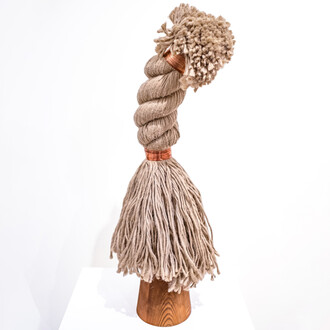Lyndsey Ingram is proud to present the first London solo show of botanical collages by American artist, Jane Hammond (b. 1950), who combines printmaking techniques with painting, photography, found objects and digital elements to create one-of-a-kind large-scale collages that explore the infinite complexity of the natural and man-made worlds.
Timed to coincide with the Chelsea Flower Show and the Chelsea Fringe Festival, this exhibition of new work showcases Hammond’s modern and disruptive approach to the historic tradition of botanical prints and the science of horticulture. Instead of seeking to record and classify plants, the artist creates imaginary tableaux: ‘Everything I make is a cocktail of fact and fiction – of things found out in the world, things I invent, and hybrids of the two.’
Some of Hammond’s botanical collages contain specific themes. For example, in one piece, all of the plants are poinsonous. Another features all of the stages of the Monarch butterfly and its food supply. All of the works contain imaginative attitudes toward colour, scale, form, and botany itself. ‘In the end, I’m looking for a bold unity that is built upon dissociation and tension, as well as harmony.’
Originally trained as a sculptor and ceramist, Hammond has evolved her own technique of making these collages, first creating an elaborate collage for the ground itself, often with Japanese papers. Then the artist begins to arrange botanical elements already printed or drawn, painted and painstakingly cut out. She continues arranging, re-arranging, and swapping until the piece unifies. Then all the elements are glued exactly in place and pressed flat under blotters and stacks of books from her library. ‘I don’t like the uniformity of surface in traditional printmaking. I want something fresher, more varied and multi-lingual.’ Each collage combines handmade and digital imagery – linoleum blocks that are hand-carved, hand-printed and later hand-coloured, with photographs the artist has taken, in markets, gardens and flower shops – as well as found images drawn from the the world of colouring books, vintage handkerchiefs, wallpaper and textiles. While collage, printmaking and photography are separate media, for Hammond, all of them are inextricably bound together in her work and are essential to her vision of art: ‘I have an encyclopedic mind that scavenges for information and imagery, wherever I can find it.’ Hammond is a passionate botanist and gained her love of plants at the side of her grandmother, who was an ambitious amateur gardener. ‘When I was six she made me memorise the Latin names of a hundred flowers.’
‘I entered the art world in the heydey of Minimalism – the era when less was more and flowers were verboten. It has taken me a long time to embrace and include this life-long interest in my practice. Looking closely at plants and birds one gains an understanding of taxonomic relationships and of the incredible complexity and variety of nature. My work embraces the fact that more is more – the infinite complexity of nature and our ability to make distinctions and associations in its contemplation – is a cause for celebration and an important part of what makes us human.’
Hammond’s work is represented in the collections of major US museums, including MoMA, New York; the Albright-Knox Museum, New York; the Brooklyn Museum, the Baltimore Museum, the Corcoran Museum, Washington DC; de Young Museum, San Francisco; San Francisco Museum of Modern Art, Museum of Contemporary Art, Chicago; National Gallery of Art, Washington DC, the Whitney Museum of American Art. Her work is also in the collections of the Bibliothèque Nationale in Paris and the Museo d’Arte Contemporaria, Mexico City.
Lyndsey Ingram comments: ‘I have admired Jane’s work for years, with a particular fondness for these works. Soon after we opened the gallery last year, Jane suggested a show in London of all new botanical collages, drawn by a particular affinity between this work and the English love of gardens . It is a privilege to be working with Jane, an artist who truly defies categorisation. Her approach to the traditional genre of botanical prints is radical and modern, and her botanical collages use printmaking techniques but they are not purely prints – each one is a unique object.’
This exhibition will be part of the Chelsea Fringe festival, with talks and events at the Lyndsey Ingram gallery. It is accompanied by a printed catalogue with an original essay by the writer, scholar and garden historian, Jenny Uglow.
















